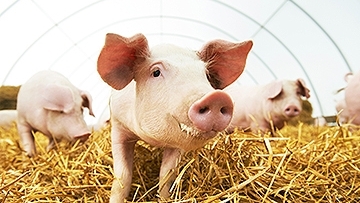African Swine Fever

African swine fever is a contagious and deadly viral swine disease affecting domestic and feral swine of all ages. It cannot be transmitted to people, and properly prepared pork products are safe to eat. Although it is not a direct threat to human health, its deadly nature in swine could result in pork product shortages, disruptions to trade, and economic impacts. There is no treatment or vaccine so the best way to protect pigs is by prevention.
African swine fever has never been found in the United States, and we want to keep it that way. It has recently been found in countries close to the United States, including the nearby Caribbean islands of Haiti and the Dominican Republic, which increases the threat of an African swine fever outbreak here. APHIS is working with Federal and State government agencies, the swine industry, and producers to keep African swine fever out of the United States. We are also preparing to respond if this disease is detected here.
- High fever
- Decreased appetite and weakness
- Red, blotchy skin or skin lesions
- Diarrhea, vomiting, or both
- Coughing and difficulty breathing
- Abortions or sudden death
Factsheet: African Swine Fever: Know the Signs and Symptoms (74.49 KB)
Practice good biosecurity! Biosecurity means doing everything you can to reduce the chances of an infectious disease being carried onto your farm. Work with your local veterinarian to develop a proper biosecurity plan for your facility. Visit Swine Disease for more information on biosecurity and related topics.
Keep your pigs away from feral swine. If your pigs have access to the outdoors, use double fencing and other measures to make sure your pigs don't come in contact with feral swine.
Don't bring African swine fever home with you when you travel abroad:
- Don't bring pork products from countries that have the disease. They can carry African swine fever into our country.
- If you visit a farm while overseas, tell U.S. Customs and Border Protection when you return to the United States.
- Thoroughly clean and disinfect, or dispose of, any clothing or shoes that you wore around pigs before returning to this country.
- Do not visit a farm or property with pigs, livestock market, sale barn, zoo, circus, pet store with potbellied pigs, or any other animal facility with pigs for at least 5 days after you return to the country.
- Learn more at Traveling With Food or Agricultural Products.
Visit Protect Our Pigs to learn more about what you can do to keep your pigs safe from African swine fever.
There is no treatment or vaccine. The only way to stop the disease is to depopulate all affected and exposed pigs.
Report Signs of Animal Disease
Producers or owners who suspect an animal disease should contact their veterinarian to evaluate the animal or herd. Find an accredited veterinarian.
Animal health professionals (veterinarians; diagnostic laboratories; public health, zoo, or wildlife personnel; and others) report diagnosed or suspected cases of nationally listed reportable animal diseases to APHIS District Offices and to the State animal health official as applicable under State reporting regulations.
Controlling African Swine Fever
The ongoing spread of African swine fever in Asia, Europe, and the Caribbean as well as classical swine fever in the Caribbean and South America has spiked concerns about their potential to enter the United States. APHIS is leading nationwide surveillance for both diseases.
- African and Classical Swine Fever Integrated Surveillance Plan outlines current diagnostic and surveillance methodologies for both diseases.
- Swine Hemorrhagic Fevers Surveillance Dashboard allows users to interact with African and classical swine fever surveillance data.
- Swine Hemorrhagic Fever Surveillance Evaluation Brief highlights successes of the integrated surveillance plan after its first year of implementation and opportunities for improving it.
Surveillance activities target:
- Swine suspected of having African swine fever, classical swine fever, or both
- Samples taken from sick pigs that are submitted to an APHIS-approved National Animal Health Laboratory Network laboratory
- Pigs condemned at slaughter by USDA's Food Safety and Inspection Service
- Pigs raised outdoors with potential exposure to feral swine or pigs fed garbage (considered high-risk pigs)
- Feral swine collected by APHIS Wildlife Services
Working with Federal and State partners and the swine industry, APHIS has put in place a comprehensive plan to prepare for and respond to a detection of African swine fever in the United States.
Hear from U.S. Secretary of Agriculture Tom Vilsack and the former U.S. Chief Veterinary Officer Jack Shere as they talk about the steps APHIS is taking to keep African swine fever out of the country and prepare for a potential detection on U.S. soil.
Following the detection of African swine fever in the Dominican Republic and Haiti, APHIS established a protection zone in Puerto Rico and the U.S. Virgin Islands in September 2021. This allows APHIS to intensify surveillance efforts and enforce stricter movement controls in those locations to keep the disease out of the United States.
APHIS also issued a Federal Order (119.43 KB) in September 2021 suspending the interstate movement of all live swine, swine germplasm, swine products, and swine byproducts from Puerto Rico and the U.S. Virgin Islands to the U.S. mainland. APHIS revised the Federal Order (146.24 KB) in December 2021 to allow processed pork products and byproducts to move interstate under certain conditions.
APHIS launched Protect Our Pigs to equip producers with the tools and resources you need to keep swine healthy and reduce the risk of spreading African swine fever.
You can find more information throughout our website:
- African Swine Fever Factsheet (262.77 KB)
- African Swine Fever Surveillance (Dashboard)
- African Swine Fever Emergency Response
- National Feral Swine Damage Management Program
We also suggest looking at resources provided by our partners:

